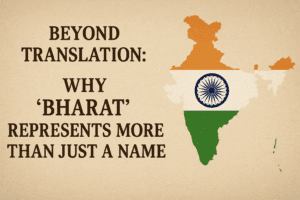Beyond Translation: Why “Bharat” Represents More Than Just a Name
RSS chief Mohan Bhagwat asserted that the name “Bharat” must never be translated to preserve its unique identity and global respect. Speaking at an education conference in Kochi, he emphasized that “Bharat is Bharat” – a proper noun representing the nation’s profound cultural and historical essence, distinct from the colonial “India.”
Bhagwat linked this identity to a vision of national strength, urging Bharat to become an economically vibrant, technologically advanced “lion,” not to dominate others, but to responsibly aid the world. He contrasted this ethos with perceived Western ideals, arguing true “Bharatiya” education teaches sacrifice and interconnectedness, not selfish individualism.
This philosophy, rooted in concepts like universal responsibility, aims to develop a nation (“Viksit Bharat”) that leads through benevolence, not exploitation. Ultimately, preserving the untranslated name “Bharat” symbolizes safeguarding this defining ethos.

Beyond Translation: Why “Bharat” Represents More Than Just a Name
The name “Bharat” resonates with a profound cultural and historical weight that transcends mere geography. RSS chief Mohan Bhagwat’s recent assertion that translating “Bharat” risks eroding its identity and global respect taps into a deeper conversation about language, heritage, and national self-perception. His comments, made at a national education conference in Kochi, offer more than a linguistic preference; they present a vision for India’s identity rooted in unique values.
The Power of an Untranslated Name
Bhagwat’s core argument is simple yet potent: “Bharat” is a proper noun, a unique identifier. Translating it to “India,” he contends, diminishes its distinctiveness. “Bharat is Bharat,” he stated unequivocally. “That is why, while talking, writing and speaking, be it personal or public, we should keep Bharat as Bharat.” This insistence goes beyond semantics. It suggests that the essence of the nation, its historical continuity, cultural depth, and the respect it commands globally, is intrinsically tied to its indigenous name. The name itself embodies an identity forged over millennia, distinct from its colonial-era counterpart.
Strength with Responsibility: A Different Paradigm
Bhagwat’s vision for “Bharat” extends far beyond nomenclature. He called for the nation to transform into a powerful “lion,” emphasizing economic vibrancy and technological prowess. Crucially, however, he framed this aspiration within a uniquely Indian ethos. “It also has to become wealthy… It should not become strong to rule over others, but to help the world,” he clarified. This distinction is vital. He envisions strength not as a tool for domination, but as a means to fulfill a responsibility – a concept deeply embedded in Indian philosophical traditions like “Vasudhaiva Kutumbakam” (the world is one family).
Education: Cultivating Connection, Not Selfishness
The venue of Bhagwat’s speech – a conference on “Bharatiya” education – provided the context for linking national identity to pedagogy. He sharply contrasted what he termed “Bharatiya Shiksha” with education focused solely on individualism. True Indian education, he argued, teaches “sacrifice and living for others,” connecting personal development to the welfare of all. “Education which teaches only selfishness is not Bharatiya Shiksha,” he asserted. He invoked the enduring legacy of figures like Lord Ram, remembered not for conquest, but for the “dharma of living for everyone.”
This educational philosophy, Bhagwat suggested, is the bedrock of India’s potential role as a “Viksit Bharat” (Developed India) or “Vishwa Guru” (World Teacher). Such a nation, guided by these principles, would inherently reject exploitation and oppression. “In our scheme of things… the world is your responsibility because the entire world has made you,” he explained, framing interconnectedness as a core tenet to be imparted through learning.
The Identity Imperative
Bhagwat’s call to preserve “Bharat” untranslated is ultimately a call to recognize and uphold a specific cultural and civilizational identity. He posits that the respect accorded to the nation stems directly from this unique identity – “because it is Bharat.” The name becomes a vessel carrying the weight of a particular worldview: one of strength tempered by duty, individual progress linked to collective welfare, and national power directed towards global upliftment rather than subjugation.
A Conversation Beyond Semantics
While the immediate takeaway might be a debate over “Bharat” vs. “India,” Bhagwat‘s remarks invite a deeper reflection. They challenge us to consider:
- The Link Between Language and Identity: How does preserving indigenous names contribute to cultural self-assurance and global recognition?
- The Nature of National Power: Can strength be redefined not as dominance, but as capacity for benevolent global contribution, rooted in specific cultural values?
- The Purpose of Education: Is there merit in an educational model that explicitly prioritizes interconnectedness and responsibility alongside individual achievement?
Whether one fully concurs with Bhagwat’s perspective or not, his intervention highlights that “Bharat” represents more than just a word on a map. It signifies a complex tapestry of history, philosophy, and aspiration – an identity its proponents believe deserves to stand untranslated, commanding respect precisely because of its unique, unadulterated essence. The conversation is ultimately about what values define the nation and how it chooses to present itself, and be recognized, on the world stage.
You must be logged in to post a comment.